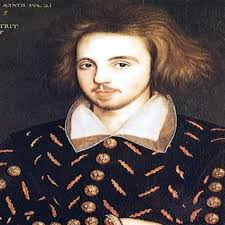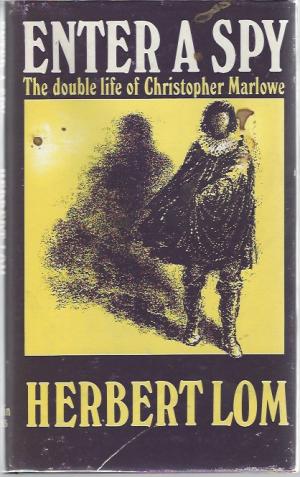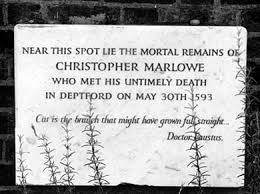Born in the year 1564, Christopher Marlowe was one of the most controversial playwrights of English drama. His life was intrigued with rumours of being an atheist, a homosexual, a drinker, and probably a spy working for the Queen.
It has been more than 400 years since Christopher Marlowe has died, but Marlowe’s death still remains an illusion and is one of the most fascinating murder mysteries that historians are yet to solve.

How did Christopher Marlowe Die?
Contents
On the dreadful afternoon of May 30th, 1593, Marlowe and three of his friends entered a lodging house to have some quick drink and some friendly chat. What happened that day still remains a riddle among critics. Apparently, a brawl broke out, and one of his associates stabbed him that killed him instantly.
What appeared as a simple bar fight put an end to the life of one of the most promising writers of the Elizabethan age forcing us to rethink whether it was a simple accidental death or is part of a much more complicated Government conspiracy.
The Conspiracy Theory
At that time, England was a Protestant nation and was going through some serious political turmoil. Headed by a female monarch, the country was subject to continuous threats, especially from Spain.
Francis Walsingham was the Queen’s most trusted spy agent and helped her eradicate several conspiracies against the crown especially the execution of Mary Queen of Scots in 1584.
Walsingham, an expert in diplomatic operations often influenced and appointed young Englishmen especially from poorer families from the notable Universities of Oxford and Cambridge. His candidates were intelligent and had an aspiration for serving the Queen. Marlowe seemed to be a perfect candidate for the purpose.
The Double Life of Christopher Marlowe
Young Marlowe was an aspiring writer, a poet, and a great scholar. In 1578, Marlowe own a scholarship that earned him a place in the Corpus Christi College in Cambridge.
In the University Marlowe used to take prolonged leaves which often rose suspicions about his whereabouts and the University denied to offer him his scholarship. The particular incident happened when rumours were heard of Marlowe seeking admission into a Catholic College in Douai and were to convert to Catholicism which was a direct attack to England’s Protestant beliefs.
Apparently, the Privy Council intervened and sent a letter to the University stating that Marlowe was in the service of the Crown and he should be exempted from such charges. Marlowe received his college degree in 1587.
Though there were no direct links of Marlowe to the Queen or to Walsingham, questions were asked about his status in the college and excess expenditures which were quite uncommon for a poor student like him. The direct intervention of the Privy Council also raised doubts about him being an active spy for the crown.
In 1592, Marlowe was arrested for illegal distribution of counterfeit coins but surprisingly there were no charges made against him which is another indication that this was probably one of his spy missions.

What was Christopher Marlowe accused of?
Marlowe was a close associate with Sir Walter Raleigh and was greatly influenced by his line of work including his religious beliefs. It is believed that Marlowe may have been a part of an atheist group called the ‘School of Knight’ which did not believe in religious fundamental values of the Church and their prejudices.
In his play, the “Jew of Malta” Marlowe directly quotes religion as a ‘childish toy’ and states that ‘there is no sin but ignorance’. This invariably should have hurt the religious sentiments of the church including the Queen, one of the reasons why he was charged later on with heresy.
Similarly, in the play ‘Edward the Second’, Marlowe depicted the real-life story of King Edward who was dethroned by his own queen Isabella of France. Critics believe that through this play Marlowe was actually projecting the debatable relationship and closeness of King Edward to many of his ‘favourites’ like Piers Gaveston and Roger Mortimer suggesting homosexuality. Homosexuality was a crime back then and Marlowe wanted his audiences to take pity and accept the character of King Edward.
In his historic play, ‘Doctor Faustus’ Marlowe showcases the character of Faustus who is an atheist and makes a pact with the devil to acquire knowledge and power. This is against Christian beliefs where atheism is heresy and worshipping the devil is one of the greatest sins a man can commit.
Marlowe was a true Renaissance writer and his unorthodox beliefs became a matter of great concern for the Anglican church and even more when they found out that it was influencing the literary and influential circle of the society.
Thomas Kyd’s accusation for Christopher Marlowe
In 1593, another important Elizabethan playwright Thomas Kyd and a friend of Marlowe accused him of heresy that led into his arrest.
In May 1593, handbills were distributed in London in the context of illegal immigration of refugees. There were references to Marlowe’s play the ‘Tamburlaine’ in the bill.
At that time Thomas Kyd was Marlowe’s roommate and some heretical documents were recovered from his room. Kyd was charged with heresy and was arrested on May 15, 1593. Kyd succumbed to the tortures in prison and wrote a letter claiming that the documents belonged to Marlowe. Marlowe voluntarily surrendered on 20th May and was later discharged.
On 30th May Marlowe was murdered in a lodging house in Deptford belonging to a widow named Eleanor Bull by one of his associates Ingram Frizer who was an agent of Thomas Walsingham. The motive of the murder was unknown and according to the eyewitnesses, an argument occurred between Frizer and Marlowe over the settlement of the supper bill. After a heated conversation, Marlowe drew out Frizer’s knife and Frizer on self-defence stabbed Marlowe in his eye and he died instantly.
Though it looks like accidental death, critics believe that it was a well-thought-out murder plan crafted by none other than Walsingham himself probably carrying out the orders of the Queen.
There are many conspiracy theories pertaining to the death of Christopher Marlowe. There is a suggestion that Marlowe’s death was sanctioned by Raleigh who feared that he might give up secrets about his organization the ‘School of Knight’. Some members of the Privy Council were atheists and they thought that Marlowe might reveal this to the general public through his plays and writings. This might be another cause for his assassination.
Another theory perhaps the most interesting one, states that Marlowe had in fact faked his own death and all the events surrounding his death was to help him avoid his death sentence.
Who killed Marlowe and why is still a mystery, but there is no doubt that Marlowe if not for his untimely death, would have been one of the greatest English writers that the world has ever known?

Check out some of Marlowe’s famous monologues
Famous Plays by Christopher Marlowe
Famous poems by Christopher Marlowe
The Inevitable Day Poem by Christopher Marlowe
The Massacre at Paris, Christopher Marlowe Summary
Christopher Marlowe Famous Quotes
Christopher Marlowe Vs William Shakespeare Comparison